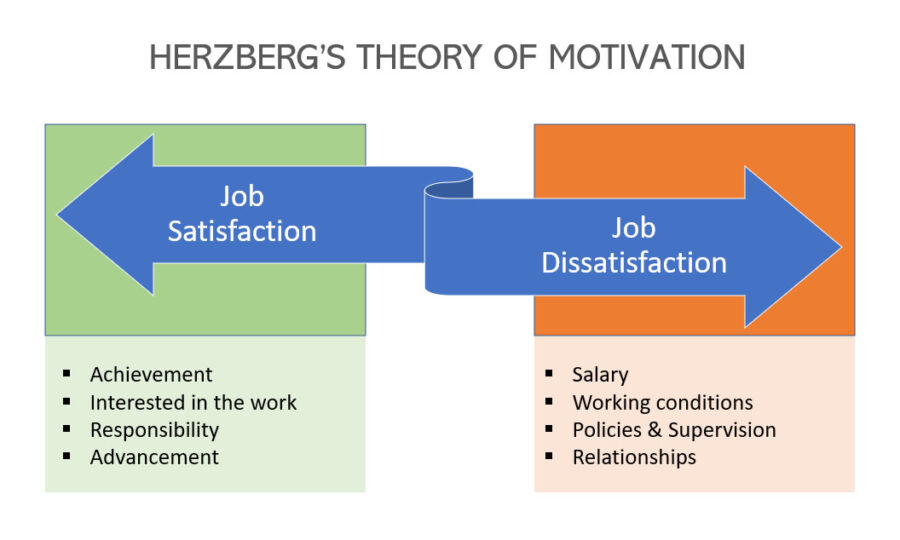We’re all familiar with Maslow’s famous Hierarchy of Needs. Fewer among us, however, know of Frederick Herzberg’s Motivation-Hygiene Theory. This is a fascinating theory that explains the basic needs of employees that must be met in order to allow your staff’s potential in the workplace to be maximised. Herzberg’s theory is a valuable resource for anyone concerned with preventing the risks of staff burnout and keeping their employees energised and motivated to thrive.
Maslow’s Hierarchy of Needs
Maslow’s Hierarchy of Needs stated that humans need to fulfil their basic needs in a hierarchical order. Furthermore, when certain basic needs are met, such as physiological needs (food, water, air) and safety needs (being safe and protected from harm), then people can naturally begin to be concerned with higher level needs such as personal growth, development and motivation in their personal lives and at work.
The important lesson here is that fulfilling lower level needs is essential for higher level needs to begin to be realised. If you feel hungry and unsafe, then it is very difficult to be concerned with flourishing in other areas of your life.
Enter Motivation-Hygiene Theory
Herzberg’s Motivation-Hygiene Theory builds on Maslow’s Hierarchy of Needs, adapting it to a workplace context. The theory allows us to see how when certain fundamental needs at work are stripped away, employees will struggle to endure and may succumb to stress, anxiety and burnout.
Much like Maslow’s Hierarchy of Needs, Herzberg maintained that certain fundamental needs at work need to be met before employees can become concerned with higher level needs like staying motivated and enthused about their work. These fundamental needs are the “hygiene” aspect of the theory. They refer to basic expectations like being paid on time, having a clean and safe office environment, and being respected by managers and colleagues.
Only in the presence of good corporate hygiene can employees begin to be concerned with higher level needs. When you are paid on time, have a clean and safe office, and feel respected and valued by your colleagues, then the “motivation” aspect of the theory kicks in. Motivation refers to staff feeling purposeful, engaged and passion-driven to excel in what they do.
Employers need to be concerned with practising good hygiene to keep their employees from becoming dissatisfied. But this alone is not enough. They should also be putting in measures to make sure that staff motivation levels are maximised.

Herzberg’s Motivation-Hygiene Theory builds on Maslow’s Hierarchy of Needs, adapting it to a workplace context.
Strategies for boosting hygiene and motivation
Motivators are different from hygiene factors. But both need to be addressed to maintain a positive workplace in which employees are empowered to thrive. Here are some tips for tackling both:
Practising good hygiene
- Have fair and equal company policies which are comprehensible and easily accessible
- Choose supervisors and managers carefully to make sure you are selecting strong leaders for your organisation
- Create space in your office for staff to socialise and build a sense of community
- Make sure your office layout is safe and conducive for work, taking employees’ specific needs into account
- Ensure managers are trained to deal with mental and physical health problems at work, and put support mechanisms in place to support staff, for example by training up a team of Wellbeing Champions or Mental Health First Aiders
- Don’t forget to reward hard work and single people out who are doing a good job.
Motivators to consider
- Regularly review employee workloads to ensure work is challenging enough
- Create policies that recognise achievement and make staff feel valued
- Ensure that staff take ownership of their work and have a sense of responsibility
- Involve staff in decision-making processes where possible to make them feel included
- Give staff opportunities to do something meaningful, such as involving the office in charitable initiatives
- Make staff feel like your organisation does something important, such as by helping people and/or businesses
- Consider implementing a staff wellbeing programme, for example by arranging regular educational talks and webinars and issuing regular newsletters with engaging content.
Remember to start by sorting out your corporate hygiene. When you have laid solid foundations, then start identifying motivators that could push your employees that extra bit and create an environment in which employees feel purposeful, engaged and passion-driven.










